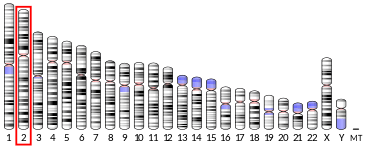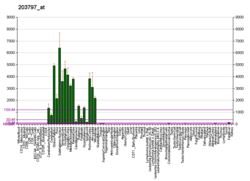Visinin-like protein 1
Visinin-like protein 1 is a protein that in humans is encoded by the VSNL1 gene.[5][6][7]
| VSNL1 | |||||||||||||||||||||||||
|---|---|---|---|---|---|---|---|---|---|---|---|---|---|---|---|---|---|---|---|---|---|---|---|---|---|
| Identifiers | |||||||||||||||||||||||||
| Aliases | VSNL1, HLP3, HPCAL3, HUVISL1, VILIP, VILIP-1, visinin like 1 | ||||||||||||||||||||||||
| External IDs | OMIM: 600817 MGI: 1349453 HomoloGene: 2542 GeneCards: VSNL1 | ||||||||||||||||||||||||
| |||||||||||||||||||||||||
| |||||||||||||||||||||||||
| |||||||||||||||||||||||||
| |||||||||||||||||||||||||
| Orthologs | |||||||||||||||||||||||||
| Species | Human | Mouse | |||||||||||||||||||||||
| Entrez | |||||||||||||||||||||||||
| Ensembl | |||||||||||||||||||||||||
| UniProt | |||||||||||||||||||||||||
| RefSeq (mRNA) | |||||||||||||||||||||||||
| RefSeq (protein) | |||||||||||||||||||||||||
| Location (UCSC) | Chr 2: 17.54 – 17.66 Mb | Chr 12: 11.33 – 11.44 Mb | |||||||||||||||||||||||
| PubMed search | [3] | [4] | |||||||||||||||||||||||
| Wikidata | |||||||||||||||||||||||||
| |||||||||||||||||||||||||
This gene is a member of the visinin/recoverin subfamily of neuronal calcium sensor proteins.[8]
The encoded protein is strongly expressed in granule cells of the cerebellum where it associates with membranes in a calcium-dependent manner and modulates intracellular signaling pathways of the central nervous system by directly or indirectly regulating the activity of adenylyl cyclase. Alternatively spliced transcript variants have been observed, but their full-length nature has not been determined.[7]
References
- GRCh38: Ensembl release 89: ENSG00000163032 - Ensembl, May 2017
- GRCm38: Ensembl release 89: ENSMUSG00000054459 - Ensembl, May 2017
- "Human PubMed Reference:". National Center for Biotechnology Information, U.S. National Library of Medicine.
- "Mouse PubMed Reference:". National Center for Biotechnology Information, U.S. National Library of Medicine.
- Polymeropoulos MH, Ide S, Soares MB, Lennon GG (Feb 1996). "Sequence characterization and genetic mapping of the human VSNL1 gene, a homologue of the rat visinin-like peptide RNVP1". Genomics. 29 (1): 273–5. doi:10.1006/geno.1995.1244. PMID 8530085.
- Kose A, Ito A, Saito N, Tanaka C (Oct 1990). "Electron microscopic localization of gamma- and beta II-subspecies of protein kinase C in rat hippocampus". Brain Res. 518 (1–2): 209–17. doi:10.1016/0006-8993(90)90974-G. PMID 2202488.
- "Entrez Gene: VSNL1 visinin-like 1".
- Burgoyne RD (2007). "Neuronal calcium sensor proteins: generating diversity in neuronal Ca2+ signalling". Nat. Rev. Neurosci. 8 (3): 182–193. doi:10.1038/nrn2093. PMC 1887812. PMID 17311005.
Further reading
- Kuno T, Kajimoto Y, Hashimoto T, et al. (1992). "cDNA cloning of a neural visinin-like Ca(2+)-binding protein". Biochem. Biophys. Res. Commun. 184 (3): 1219–25. doi:10.1016/S0006-291X(05)80012-9. PMID 1375457.
- Lenz SE, Braunewell KH, Weise C, et al. (1996). "The neuronal EF-hand Ca(2+)-binding protein VILIP: interaction with cell membrane and actin-based cytoskeleton". Biochem. Biophys. Res. Commun. 225 (3): 1078–83. doi:10.1006/bbrc.1996.1298. PMID 8780737.
- Braunewell KH, Spilker C, Behnisch T, Gundelfinger ED (1997). "The neuronal calcium-sensor protein VILIP modulates cyclic AMP accumulation in stably transfected C6 glioma cells: amino-terminal myristoylation determines functional activity". J. Neurochem. 68 (5): 2129–39. doi:10.1046/j.1471-4159.1997.68052129.x. PMID 9109541.
- Kobayashi M, Sakai E, Furuta Y, Takamatsu K (1999). "Isolation of two human cDNAs, HLP3 and HLP4, homologous to the neuron-specific calcium-binding protein genes". DNA Seq. 9 (3): 171–6. doi:10.3109/10425179809072192. PMID 10520747.
- Bernstein HG, Baumann B, Danos P, et al. (2000). "Regional and cellular distribution of neural visinin-like protein immunoreactivities (VILIP-1 and VILIP-3) in human brain". J. Neurocytol. 28 (8): 655–62. doi:10.1023/A:1007056731551. PMID 10851344.
- Braunewell KH, Brackmann M, Schaupp M, et al. (2001). "Intracellular neuronal calcium sensor (NCS) protein VILIP-1 modulates cGMP signalling pathways in transfected neural cells and cerebellar granule neurones". J. Neurochem. 78 (6): 1277–86. doi:10.1046/j.1471-4159.2001.00506.x. PMID 11579136.
- Schnurra I, Bernstein HG, Riederer P, Braunewell KH (2002). "The neuronal calcium sensor protein VILIP-1 is associated with amyloid plaques and extracellular tangles in Alzheimer's disease and promotes cell death and tau phosphorylation in vitro: a link between calcium sensors and Alzheimer's disease?". Neurobiol. Dis. 8 (5): 900–9. doi:10.1006/nbdi.2001.0432. PMID 11592857.
- Bernstein HG, Braunewell KH, Spilker C, et al. (2002). "Hippocampal expression of the calcium sensor protein visinin-like protein-1 in schizophrenia". NeuroReport. 13 (4): 393–6. doi:10.1097/00001756-200203250-00006. PMID 11930147.
- Spilker C, Dresbach T, Braunewell KH (2002). "Reversible translocation and activity-dependent localization of the calcium-myristoyl switch protein VILIP-1 to different membrane compartments in living hippocampal neurons". J. Neurosci. 22 (17): 7331–9. doi:10.1523/JNEUROSCI.22-17-07331.2002. PMC 6757958. PMID 12196554.
- Lin L, Braunewell KH, Gundelfinger ED, Anand R (2002). "Functional analysis of calcium-binding EF-hand motifs of visinin-like protein-1". Biochem. Biophys. Res. Commun. 296 (4): 827–32. doi:10.1016/S0006-291X(02)00943-9. PMID 12200122.
- Lin L, Jeanclos EM, Treuil M, et al. (2003). "The calcium sensor protein visinin-like protein-1 modulates the surface expression and agonist sensitivity of the alpha 4beta 2 nicotinic acetylcholine receptor". J. Biol. Chem. 277 (44): 41872–8. doi:10.1074/jbc.M206857200. PMID 12202488.
- Spilker C, Gundelfinger ED, Braunewell KH (2002). "Evidence for different functional properties of the neuronal calcium sensor proteins VILIP-1 and VILIP-3: from subcellular localization to cellular function". Biochim. Biophys. Acta. 1600 (1–2): 118–27. doi:10.1016/s1570-9639(02)00452-1. PMID 12445467.
- Strausberg RL, Feingold EA, Grouse LH, et al. (2003). "Generation and initial analysis of more than 15,000 full-length human and mouse cDNA sequences". Proc. Natl. Acad. Sci. U.S.A. 99 (26): 16899–903. Bibcode:2002PNAS...9916899M. doi:10.1073/pnas.242603899. PMC 139241. PMID 12477932.
- Braunewell KH, Brackmann M, Manahan-Vaughan D (2003). "Group I mGlu receptors regulate the expression of the neuronal calcium sensor protein VILIP-1 in vitro and in vivo: implications for mGlu receptor-dependent hippocampal plasticity?". Neuropharmacology. 44 (6): 707–15. doi:10.1016/S0028-3908(03)00051-0. PMID 12681369.
- Gerhard DS, Wagner L, Feingold EA, et al. (2004). "The status, quality, and expansion of the NIH full-length cDNA project: the Mammalian Gene Collection (MGC)". Genome Res. 14 (10B): 2121–7. doi:10.1101/gr.2596504. PMC 528928. PMID 15489334.
- Gonzalez Guerrico AM, Jaffer ZM, Page RE, et al. (2005). "Visinin-like protein-1 is a potent inhibitor of cell adhesion and migration in squamous carcinoma cells". Oncogene. 24 (14): 2307–16. doi:10.1038/sj.onc.1208476. PMID 15735716.
- Rual JF, Venkatesan K, Hao T, et al. (2005). "Towards a proteome-scale map of the human protein-protein interaction network". Nature. 437 (7062): 1173–8. Bibcode:2005Natur.437.1173R. doi:10.1038/nature04209. PMID 16189514.
- Jheng FF, Wang L, Lee L, Chang LS (2007). "Functional contribution of Ca2+ and Mg2+ to the intermolecular interaction of visinin-like proteins". Protein J. 25 (4): 250–6. doi:10.1007/s10930-006-9008-5. PMID 16703469.
- Lim J, Hao T, Shaw C, et al. (2006). "A protein-protein interaction network for human inherited ataxias and disorders of Purkinje cell degeneration". Cell. 125 (4): 801–14. doi:10.1016/j.cell.2006.03.032. PMID 16713569.
This article is issued from Wikipedia. The text is licensed under Creative Commons - Attribution - Sharealike. Additional terms may apply for the media files.





